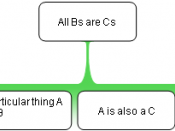A fallacy can be defined as an error in one person's reasoning, bringing about an invalid argument. A fallacy can be described as, "A mistake in the way that the final conclusion of any argument, or any intermediate conclusions, are logically related to their supporting premises" (http://www.wordiq.com/definition/Fallacy). A fallacy is an "argument" in which the premises given for the conclusion do not provide the needed degree of support. They are "arguments" which appear to be insufficient arguments, but the premises do not provided enough support for the conclusion. In such cases, even if the premises were true, the conclusion would not be more likely to be true (http://www.datanation.com/fallacies). This paper will discuss three logical fallacies and provide examples of each.
In order to understand what a fallacy is we must understand what an argument is. An argument has of one or more premises and one conclusion. A premise is a statement that is either true or false, that is offered in support of a claim being made, which is the conclusion which is also a sentence that is either true or false.
"There are two main types of arguments, relevance and insufficient. A relevance argument is an argument such that the premises provide which is complete support for the conclusion. An insufficient argument is an argument such that the premises provide with some degree of support but less than complete support for the conclusion" (http://www.nizkor.org/features/fallacies/). If the premises actually provide the required degree of support for the conclusion, then the argument is a good one.
Ad Hominem arguments are fallacies of relevance trying to discredit a claim or proposal by attacking its proponents instead of providing a reasoned examination of the proposal itself. Hence, "ad Hominem" literally means "against the person." Ad Hominem arguments come in at least five varieties,


